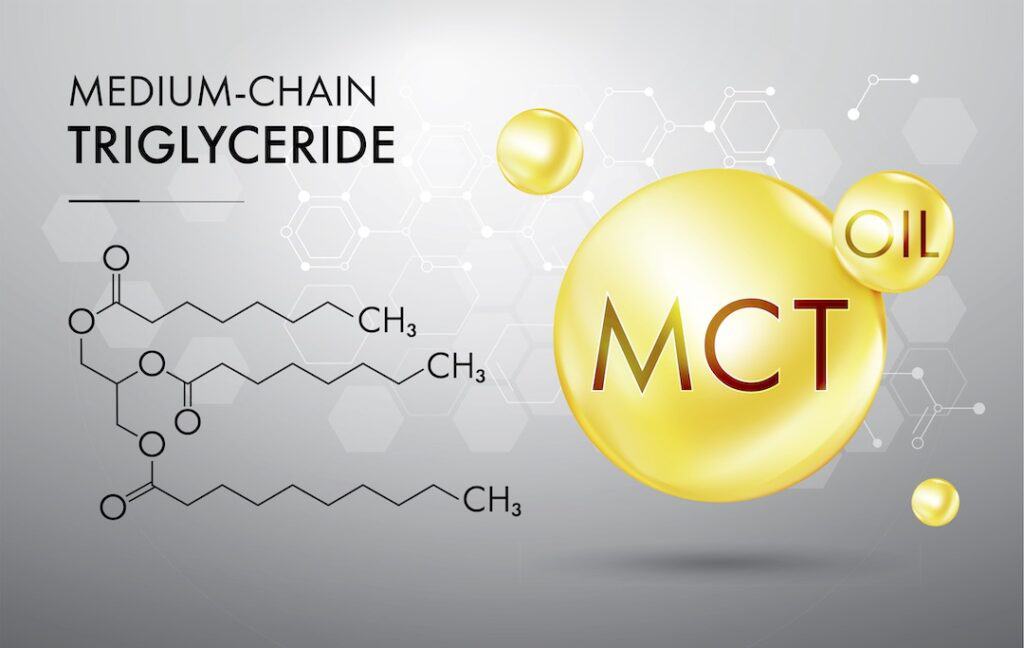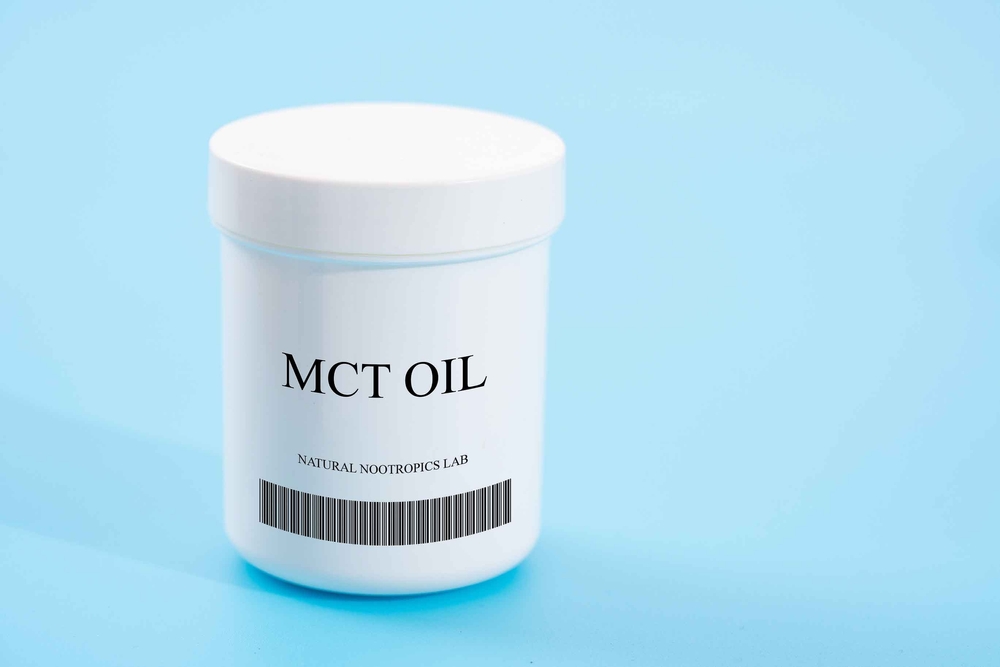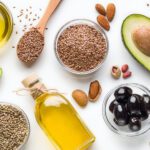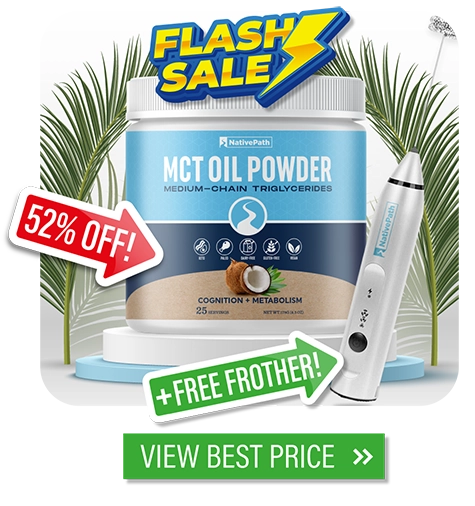We all need help when it comes to our health. Very few health products have the ability to increase health on multiple levels while supporting weight loss, muscle recovery and physical endurance. MCT has the ability to do this which is why it’s such a popular supplement for the everyday person, athletes and body builders.
What Is MCT Oil?
MCT is a healthy form of saturated fatty acid. It stands for medium-chain triglyceride oil which are medium-length chains of fats called triglycerides. The molecules in MCT are smaller and easier to digest than the longer-chain fatty acid found in other food. This means you absorb it into your bloodstream faster where it converts to energy for our immediate use.
Fats are generally categorized based on how many carbons they have. Short- chain fats like butyric acid has less than 6 carbons, medium-chain fats have somewhere between 6 and 12 carbons while long-chain fats like omega-3s have anywhere between 13 and 21 carbons. Because MCTs are shorter in length, they’re easier to break down. This is why they are absorbed faster. No enzyme is needed to break them down, so they go directly to your liver, where they have a thermogenic effect, speeding up the metabolism.


There are 4 types of MCTs. These include:
- Caproic acid (C6)
- Caprylic acid (C8)
- Capric acid (C10)
- Lauric acid (C12)
MCTs are usually extracted from coconut oil but can also be found in dairy and palm kernel oil. Approximately 62 to 65 percent of the fatty acids in coconut oil are MCTs which makes it a popular source for MCT extraction.
What Are The Benefits of MCT Oil?
MCT oil has many benefits and in this article, we’ll take a closer look at 10 of them. Enough research has been done on MCT oil to scientifically back up each of these benefits. Links to the research have been included with superscript [like this] so that you can follow up on any benefits that apply to you.
Not all types of MCT oil are made equal. The various types of MCT oil have different benefits in differing degrees. For this reason, I’ve also included a breakdown of what to look for in an MCT product and I’ll link to to a resource that will help you decide which brand is right for you.
Here’s a quick rundown:
• Increases Weight Loss
• Improves Digestion
• Fights Unhealthy Bacteria & Virus
• Reduces Risk of Heart Disease
• Improves Athletic Endurance
• Helps to Manage Epilepsy & Symptoms of Autism
• Increases Energy, Cognitive Function and Mood
• Regulates Blood Sugar Levels
• Improves Symptoms of Alzheimer’s Disease
Increases Weight Loss
There are a variety of studies done on MCT oils and its effects on weight loss. There are a number of reasons for it contributing weight loss.


“…suppress fat deposition through enhanced thermogenesis and fat oxidation in animal and human subjects.”[1]
Medium-chain fatty acids: Functional lipids for the prevention and treatment of the metabolic syndrome, 2010
- Thermogenesis: Studies have found that MCTs have the ability to “suppress fat deposition through enhanced thermogenesis and fat oxidation in animal and human subjects.”[1] This means that MCTs helps to create ketones so that you get the benefits of the keto diet without needing to lower your carbohydrate intake. Studies show that the rise in fat oxidation produced by MCTs leads to weight loss in the mid region where fat may be stored.[2]
- Satiate hunger: MCTs have been found to increase 2 hormones that produce a feeling of fullness. These hormones are peptide YY and leptin.[3] Another study found that people who ate 2 tablespoons of MCT oil, ate less than those who consumed coconut oil.[4] Multiple studies, including these mentioned, indicate that MCT lowers the rise of triglycerides and glucose which curbs food and sugar cravings.
- Improved digestion and bodily functions: As you’ll see in the following benefits, MCTs facilitate digestion, increase energy levels and help with muscle recovery as well, which all leads to weight loss.
Improves Digestion
MCTs may also support weight loss through their positive effect on the digestive system. The main ways it supports digestion is similar to some of the positive effects of probiotics.


“dietary medium chain triglycerides (MCT), previously found to promote lipid catabolism, energy expenditure and weight loss, can ameliorate metabolic health via their capacity to improve both intestinal ecosystem and permeability. MCT-enriched diets could therefore be used to manage metabolic diseases through modification of gut microbiota.”
Gut Microbiota and Metabolic Health: The Potential Beneficial Effects of a Medium Chain Triglyceride Diet in Obese Individuals, 2016
- Supports gut health: MCTs have been used to positively support the delicate balance of bacteria in the stomach. In this study, researchers show how “dietary medium chain triglycerides (MCT), previously found to promote lipid catabolism, energy expenditure and weight loss, can ameliorate metabolic health via their capacity to improve both intestinal ecosystem and permeability. MCT-enriched diets could therefore be used to manage metabolic diseases through modification of gut microbiota.”[5]
- Improves nutrient absorption: In order to absorb nutrients from food, fatty acids must be consumed. Many nutrients like beta-carotene, vitamin E, calcium, magnesium, phosphorus and lutein are dependent on fatty acids for proper absorption.
- Less strain on the liver: Because MCTs don’t need to be broken down by the liver, it is free to focus on the digestive and metabolic function.
Fights Unhealthy Bacteria, Viruses, Fungus, Yeast, and Candida
MCTs have the ability to reduce or destroy unhealthy bacteria, viruses, fungus and yeast. The benefits of this include a healthier immune system, respiratory and reproductive as well as better digestive function.
- Has antimicrobial properties: Studies have found the antimicrobials in MCT’s medium-chain fatty acids to be beneficial at reducing all manner of unhealthy bacteria including clostridium difficile.[6] By encouraging microbiome balance, digestion is improved along with a healthier immune system.
- Kills harmful viruses and bacteria: Medium-chain fatty acids have been known to kill streptococcus, straphylococcus, Neisseria, ulcers, respiratory viruses and some STDs.
- Has antifungal properties: MCTs have been observed to reduce the spread of infectious fungus in hospitals by 50%.[7]
- Reduces Yeast/Candida: Candida is a type of yeast. When there is overgrowth it can cause thrush, skin issues, brain fog, fatigue and digestive issues. MCTs have been observed to reduce Candida by 25%.[8]
Reduces Risk of Heart Disease


Metabolic syndrome is a term used to describe a number of conditions that happen simultaneously and increase your risk of heart disease, stroke and type 2 diabetes. The conditions include hypertension, high blood sugar, obesity, and excess weight in the mid region. MCTs protect cardiovascular health by addressing these issues in a number ways.
- Reduces bad cholesterol: One study performed on rats showed that MCTs improved serum lipid profiles and reduced hepatic total cholesterol[9]
- Increases weight loss: MCTs reduce obesity and fat in the mid region as well as balancing blood sugar levels to facilitate further weight loss. This goes a long way towards protecting the body from metabolic syndrome, reducing the risk of heart disease and high blood pressure.
Improves Athletic Endurance
MCTs have been found to be particularly helpful in assisting with exercise by reducing the lactic acid produced during workouts or athletic activity. When we exercise, our bodies use oxygen to breakdown glucose for energy. If there’s not enough oxygen to complete this task, lactic acid is formed. This can be turned into energy without oxygen; however, it often builds up faster than it can be used. This buildup causes muscle ache, fatigue, cramps, burning, rapid breathing, weakness, stomach pain and even nausea. MCT helps to reduce the buildup of lactic acid.
- Improves endurance: One study showed that cyclists who took 1.5 teaspoons of MCT oil before exercising were able to exercise with greater ease.[10] It also discovered that taking the MCT oil before exercise may help you burn fats instead of carbs for energy.
- Improves performance: The instant energy boost achieved from the MCTs may also help with athletic performance.
Helps to Manage Epilepsy
MCTs convert to ketones which are known to be a great benefit when managing epilepsy and seizures. The ketogenic diet actually began as a way to manage epilepsy.
- Controls seizures: One study found that the MCT Capric acid (C10) controlled seizures better than a popular anti-epileptic drug.[11]
- Blocks seizure receptors: Another study, which was conducted on rats, showed that Capric acid (C10) blocked the receptors in the brain that cause seizures.[12]
Improves Symptoms of Autism
MCTs have been observed to help some children with autism. Since autism exists on a spectrum, no two children are alike so results, while promising, are not guaranteed. None the less they are worth exploring.
- Improved behavior: Studies have shown some improvement for children when they are placed on a ketogenic diet; “Children administered a modified ketogenic gluten-free diet with supplemental MCT significantly improved core autism features assessed from the ADOS-2 after 3 months on diet” MCTs convert to ketones and provide a faster way to experience the ketogenic benefits.
- Improved symptoms: Another study showed that after 6 months on the ketogenic diet “(60%), improvement was recorded in several parameters and in accordance with the Childhood Autism Rating Scale.” MCTs allow children to experience ketogenic benefits without the need to keep children on this strict diet.
Increases Energy, Cognitive Function and Mood
Usually, the body has to go through a complex process of converting fat to energy. The liver is the organ that metabolizes and breaks down fat in order to convert it to energy or store it as fat. MCTs however, don’t need to be broken down. They easily enter our cells and may be used as energy right away.[13] This has a variety of positive effects on the body.


- More energy: Since the fats immediately convert to energy without an exhaustive digestive process, they can give you a direct boost without the need for excess carbs.
- Better Cognitive function: The brain is mostly made up of fatty acids and needs a steady supply in order for us to think clearly and focus well.
- Improved mood: Better cognitive function and energy levels have a powerful effect on our mood. The result is more positivity and an improved mood.
Regulates Blood Sugar Levels


Several studies have shown that MCTs are a powerful way to manage insulin levels.
- Increases insulin metabolism: One study found that in healthy people, insulin metabolism increased by 6% and 9% in participants with blood-sugar issues.[14]
- Improves diabetic risk factors: Another study showed that MCTs improved diabetic risk factors, including insulin resistance, for a group of patients with type 2 diabetes.[15]
Improves Symptoms of Alzheimer’s Disease
People with mild to moderate Alzheimer’s disease have been found to benefit from the use of MCTs.
- Improved cognition: Brain glucose uptake is damaged in people with Alzheimer’s disease. Since MCTs provide an alternative supply of brain fuel in the form of ketones, cognitive functions including memory, have been observed to improve with 20 to 70 grams of MCTs a day in patients with mild to moderate Alzheimer’s disease.[16]
- Improved memory: Short-term memory was improved in 20 subjects with just a single dose of MCTs.[17]
Is All MCT Oil The Same?


The four MCTs each have slightly different benefits, so not all brands or formulas may be the same. To get the best MCT oil for you, it’s a good idea to understand what the four MCTs do.
⦿ Caproic acid (C6):
This MCT has converts to ketones but only a tiny amount is found in coconut oil. It is harsher than C8 and C10 and may even taste bad or upset your stomach. Some cheaper brands may not strain enough of this MCT from the formula, giving it a harsher flavor.
⦿ Caprylic acid (C8)
This is an MCT that turns into ketones in only 3 steps and is therefore considered the best for producing ketogenic energy. It is the most potent of the MCTs and is a powerful antifungal agent, fighting yeast in the body. It is the one most commonly used for medicinal purposes and achieving weight loss, due to its potent nature.
⦿ Capric acid (C10)
This MCT is also packed full of health benefits. As well as having all the benefits of the MCTs, it also converts into monocaprin in the body where it becomes a powerful antiviral and antimicrobial agent. It also converts into ketones, taking only slightly longer than the mighty C8 variety.
⦿ Lauric acid (C12)
Lauric acid is very abundant in coconut oil. In fact, it makes up approximately half of it. On its own, it functions a little more like a long-chain triglyceride because it needs to be broken down and for this reason, it may be more beneficial to consume directly from coconut oil if you are specifically wanting a ketogenic effect. Lauric acid has extremely powerful antimicrobial and antiviral properties and can be a valuable part of the diet.
For a ketogenic effect, it’s recommended to get an MCT with a high amount of C8, which will produce the most ketones. C10 is also a great addition to an MCT formula. Lauric acid and C6 may be best consumed directly from coconut oil as part of a healthy diet.
It’s important to be aware of the source of MCT as well. MCTs are generally found in:
- coconut oil
- palm oil
- cheeses
- butter
- full fat yogurt
Coconut oil is the most sustainable source of MCTs. They are abundant in this oil, and it is a sustainable source. Palm oil on the other hand is a very controversial source for MCT oil because of deforestation, danger to wildlife and bad treatment of workers.
It’s also important when buying the MCT brand of your choice that you make sure there aren’t any bonus filler oils in the mix.
Next Steps
If you’re looking to uncover which is the best MCT oil for you, I recommend taking a look at Natural Review’s Top MCT Products for 2022. They have in depth reviews that can help you to make an informed choice on the best brands available on the market today.
- https://www.sciencedirect.com/science/article/abs/pii/S104366180900276X
- https://pubmed.ncbi.nlm.nih.gov/12975635/
- https://www.ncbi.nlm.nih.gov/pmc/articles/PMC4192077/
- https://www.sciencedirect.com/science/article/abs/pii/S0031938417302111
- https://pubmed.ncbi.nlm.nih.gov/27187452/
- https://pubmed.ncbi.nlm.nih.gov/24328700/
- https://pubmed.ncbi.nlm.nih.gov/10507598/
- https://pubmed.ncbi.nlm.nih.gov/17651080/
- https://www.sciencedirect.com/science/article/abs/pii/S104366180900276X
- https://pubmed.ncbi.nlm.nih.gov/19436137/
- https://www.ncbi.nlm.nih.gov/pmc/articles/PMC3625124/
- https://pubmed.ncbi.nlm.nih.gov/26608744/
- https://pubmed.ncbi.nlm.nih.gov/12634436/
- https://pubmed.ncbi.nlm.nih.gov/19931617/
- https://pubmed.ncbi.nlm.nih.gov/17570262/
- https://nyaspubs.onlinelibrary.wiley.com/doi/full/10.1111/nyas.12999
- https://pubmed.ncbi.nlm.nih.gov/15123336/








